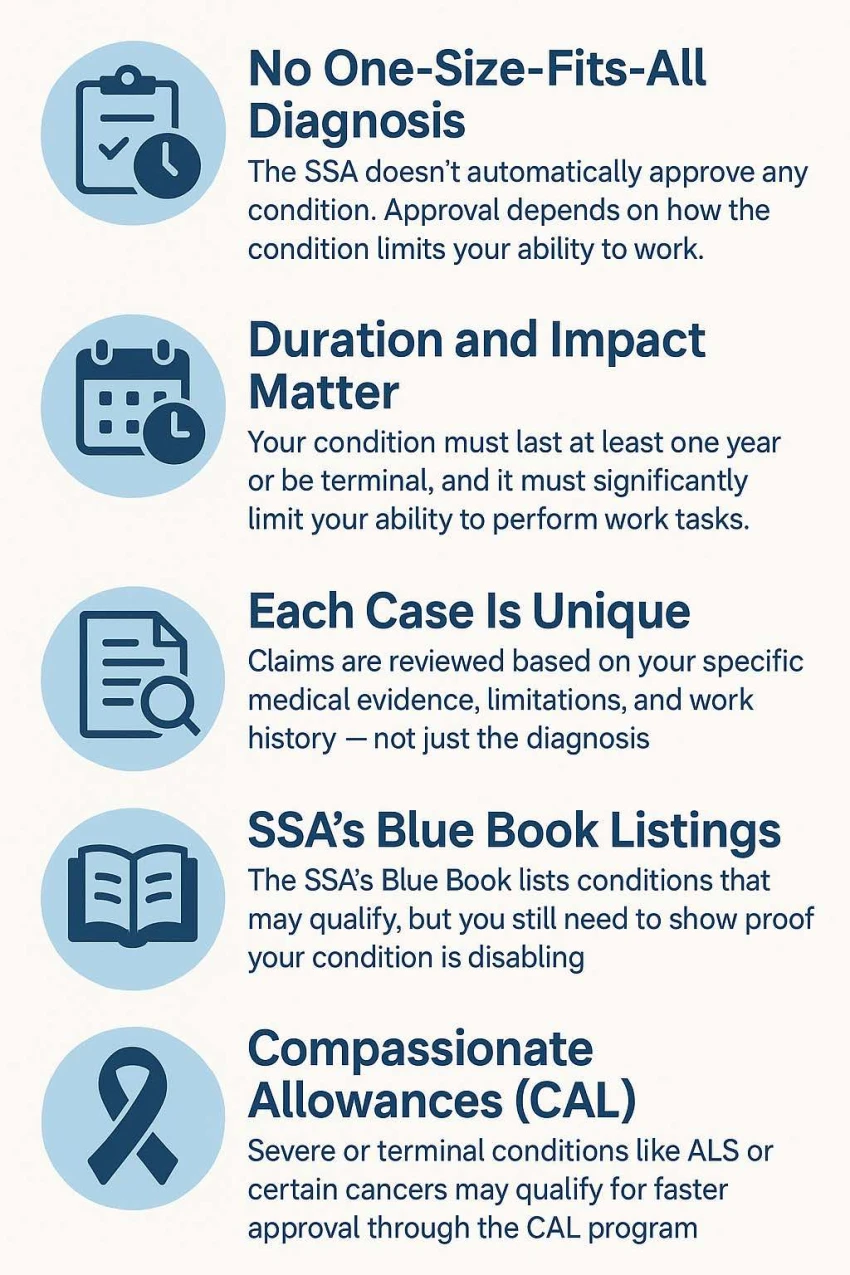
As the old adage goes, “Health is wealth.” It’s a phrase that resonates with many of us, as we all know how important it is to maintain good health. Unfortunately, accidents and injuries can happen anytime, often resulting in serious consequences for our physical well-being.
One such consequence could be an injury that prevents you from earning an income. This can devastate your life, leaving you struggling to pay bills and support yourself or your family. In some cases, returning to work may not be possible due to the severity of the injury. In contrast, others might need to take lower-paying jobs that don’t provide enough financial security. And if medical bills start piling up alongside these challenges? The situation becomes even more challenging. For those who desire to serve others and find purpose through their careers, losing this ability due to an injury can feel like a loss of identity and purpose altogether.
Our North Carolina Social Security Disability Lawyer and South Carolina Social Security Disability Lawyer team can help you navigate your disability issues and help ease the headache of doing it alone.

No One-Size-Fits-All Diagnosis
The Social Security Administration (SSA) does not maintain a definitive list of illnesses or injuries that result in immediate approval. Instead, the focus is on how severely the condition limits your ability to perform basic job functions.
Duration and Functional Impact Matter Most
What matters most is not the label of the condition but how long it lasts and how significantly it affects your capacity to work. To qualify, the impairment must either be terminal or persist for at least one year with considerable limitations on physical or mental functions.
Every Case Is Unique
Disability claims are reviewed based on the individual’s medical records, functional limitations, and work history. Even two people with the same diagnosis may have very different outcomes depending on the evidence provided.
SSA’s Blue Book Listings
The SSA provides a “Listing of Impairments,” commonly called the Blue Book, which outlines specific medical conditions and the severity levels that may qualify someone for benefits. Meeting a listed criterion can streamline the evaluation, but it still requires medical documentation that proves the condition is disabling.
Compassionate Allowances (CAL)
To speed up approvals for applicants with severe or terminal conditions, the SSA has created the Compassionate Allowances program, which covers certain diseases and diagnoses that almost always meet disability standards. These include conditions like ALS, early-onset Alzheimer’s, and certain childhood disorders and cancers.
There are no conditions that automatically qualify you for disability benefits (though some may qualify you for faster approval). However, the Social Security Administration (SSA)‘s “Blue Book” lists conditions it will consider for review for people applying for disability benefits. Among them are:
- Musculoskeletal disorders (e.g., bone, joint injuries, skeletal spine injuries)
- Special senses and speech (e.g., visual disorders, blindness)
- Respiratory disorders (e.g., chronic bronchitis, emphysema, asthma)
- Cardiovascular system disorders (e.g., chronic heart failure)
- Digestive system disorders (e.g., inflammatory bowel disease, liver dysfunction)
- Genitourinary disorders (illnesses involving the urinary and genital organs)
- Hematological disorders (illnesses of the blood, blood-forming organs)
- Skin disorders (e.g., dermatitis, burns, chronic skin infections)
- Endocrine disorders (e.g., pituitary gland disorders, thyroid gland disorders)
- Congenital disorders that affect multiple body systems
- Neurological disorders (e.g., epilepsy, benign brain tumors)
- Mental disorders (e.g., bipolar disorder, anxiety, depression)
- Cancer (malignant neoplastic diseases)
- Immune system disorders (e.g., HIV infection, lupus, inflammatory arthritis)
Of the ones above, the main ones include
- Musculoskeletal: Serious conditions affecting the muscles or bones that significantly hinder your ability to work and are not expected to improve with medical treatment.
- Cardiovascular: Health issues impacting the heart or circulatory system, such as heart failure, that can interfere with daily activities and work.
- Hematological: Conditions like bone marrow failure that disrupt the production and function of blood cells.
- Skin: Long-term skin conditions that make it difficult or impossible to perform work-related tasks.
- Endocrine: Disorders caused by hormonal imbalances that affect specific organs or body systems, limiting normal function.
- Neurological: Diseases or disorders of the nervous system that severely impact movement, coordination, or mobility.
The SSA’s Listing of Impairments – Adult Listings (Part A) contains all these conditions, which apply to adults aged 18 and older. The SSA has identified conditions in these categories to be severe because they limit a person’s functioning.
We Serve Locations All Over North and South Carolina
If you or a loved one is living with a qualifying disability, you could be eligible for Social Security Disability (SSD) benefits. At Farmer & Morris Law, PLLC, we can review your case to determine if your condition(s) qualify for disability payments.
Personal Injury Lawyer Near Me (828) 286-3866
Your Impairment does Not Have to Be on the SSA’s List
If you want to apply for Social Security Disability benefits, it is important to note that your impairment does not have to appear on the SSA’s list. Examples of such conditions include carpal tunnel syndrome and celiac disease, among others.
However, you must present a formal diagnosis of your condition to the SSA that shows it is a “medically determinable impairment” that prevents you from functioning at full capacity. This means your condition must be severe enough to prevent you from gainful activity such as working or performing your daily activities. This reduction in capacity is known as the “residual functional capacity.”
If your disability meets the SSA’s requirements, it might consider it to be equivalent to a listed condition. You must obtain this diagnosis from your doctor to prove your condition, but it is only the start of the process. It does not mean you will automatically receive approval for benefits.
Listed and Unlisted Conditions Must Be Severe
Whether the SSA has or hasn’t listed your impairment, you will need more than a diagnosis to qualify for disability benefits. For listed conditions, your diagnosis and medical records must match the SSA’s requirements for that specific condition. The medical evidence you present must align with the symptoms, signs, and other criteria for that impairment. If you don’t meet all the requirements of a listed condition, you can still present your medical evidence. The SSA can review it and determine if its severity equals a severe impairment.
Presumptive Conditions Can Qualify You for Faster Approval
A “presumptive” disability entitles you to faster approval and payment. These disabilities are generally quite severe. Per the Social Security Administration (SSA), your condition could be considered presumptive if you have the following:
- Amputation of the leg at the hip
- Total deafness in one or both ears
- Total blindness in one or both eyes
- Immobility without a wheelchair due to a chronic condition
- Stroke (of more than three months ago) with difficulty walking or using a hand/arm
- Cerebral palsy, muscular dystrophy, muscular atrophy; and difficulty walking, speaking, or coordinating the hands and arms
- Human immunodeficiency virus (HIV) that is symptomatic or acquired immunodeficiency syndrome (AIDS)
- Designation of a terminal illness for which you are (or your loved one is) receiving hospice care
- Spinal cord injury without the ability to walk independently for more than 2 weeks
- End-stage renal disease (ESRD)
- Amyotrophic lateral sclerosis (ALS) or Lou Gehrig’s Disease
While these conditions often merit fast or automatic disability approval and dispensation of benefits, you may still have a qualifying disability that is considered presumptive by the Social Security office. Parents with children with disabilities may also be entitled to SSA benefits through presumptive conditions. Examples include Downs Syndrome (or another neurodevelopmental or intellectual disability) and low birth weight.
More Specific Conditions that Could Entitle You to Benefits
It is important to note that every disability applicant presents individual circumstances that could qualify or disqualify them for benefits. With this in mind, some of the specific conditions the SSA lists under its broader medical categories include:
- Liver disease
- Inflammatory bowel disease (IBD)
- Epilepsy
- Cerebral palsy
- Traumatic brain injury
- Multiple sclerosis (MS)
- Connective tissue disorders
- Inflammatory arthritis
- Depressive disorder
- Bipolar disorder
These are just some of the many conditions the SSA lists as potential prerequisites for receiving disability benefits through one or more federal programs. The additional context, such as medical evidence, may be required to determine your eligibility and the number of benefits you could receive if you are eligible. As such, these conditions do not automatically qualify you for disability benefits.
Applying for Disability Benefits Can Be a Challenging Process
According to the SSA, many applicants for disability benefits have had their initial application denied for various reasons, including:
- Technical problems with an application
- Disqualification based on the medical information
Between 2001 and 2010, the SSA approved only about 45 percent of disability benefits claims. This suggests that applying for disability benefits is not straightforward for many applicants. SSDI or SSI application errors are possible, if not likely.
You have the right to seek help from a third party to help you apply for Social Security Disability benefits. Farmer & Morris Law, PLLC, can review your application, saving you time and helping you avoid errors that could delay your claim.
How Our Lawyer Could Handle Your Disability Benefits Application Process
The process of proving your disability will take time, but you don’t have to go through it by yourself. The SSA allows you to assign a representative who can:
- Correspond with the SSA on your behalf
- Access and collect your medical records to apply for benefits
- Fill out paperwork on your behalf
- Accompany you to any interviews or hearings required to complete your application
We Will Make Sure Your Disability Benefits Application Is Error-Free
If you hire one of our attorneys for tasks related to your SSDI or SSI application, we will ensure your application is accurate and manage the appeals process as necessary. Our firm handles all aspects of your claim, from filing your claim to the appeals process, so that you can focus on your health and well-being.
We will help you understand the SSA’s designated conditions and related medical requirements and your status regarding those. If you need further evaluation or medical evidence to establish your disability, we can advise you on the appropriate steps.
How a Disabling Medical Condition May Affect You and Your Family
You may face several direct and secondary challenges resulting from a medical condition, which may contribute to your eligibility for disability benefits. If you are disabled and cannot maintain steady employment–or any employment at all–then you may:
- Be in a constant state of financial strain
- Feel excessive stress stemming from your disability and the financial pressure it may impose
- Be unable to do seemingly basic life tasks without help
- Suffer mentally and emotionally because of your health condition
- Feel unable to engage in many – if not all – activities that once brought you joy
- Fall short in providing the income your family needs to survive and thrive
Consider Legal Help As You Seek Social Security Disability Benefits
Disabilities can adversely affect your quality of life and the quality of life of those who depend on you. Health conditions do not consider your character, and you could be in a difficult position through no fault of your own. You may be able to ease your financial burden with assistance from various benefits programs. You can contact our Social Security Disability attorney, who can guide you through the disability claim process.
Additional Information that May Impact Your Benefits Eligibility
The SSA outlines some requirements to apply for benefits under SSDI and SSI. They include:
- Having a condition that has prevented you from working for at least one year
- Being at least 18 years of age
Beyond these basic requirements, the SSA will request several types of information as part of your application. Your answers to these questions and ability to provide various forms of documentation may directly impact your eligibility for benefits. Some questions on the Checklist for Online Adult Disability Application may ask:
- The age you were at the time that you became disabled
- How many years you participated in the workforce before becoming disabled
- The nature and severity of the medical condition that causes you to be disabled
- Your marital status
- Whether you have any dependents
- Whether you can complete any work to earn an income
- Your education and work history
Your ability (or inability) to provide thorough documentation about the nature of your medical condition and the date of the condition’s onset is essential in determining your eligibility for benefits through SSDI and SSI.
What Is the Definition of “Disability” According to the Social Security Administration (SSA)?
According to the Social Security Administration (SSA), disability is a condition that prohibits an individual from engaging in substantial gainful activity due to a physical or mental impairment. The SSA evaluates disability claims using a five-step process, which includes determining if the applicant has worked enough years and if their condition meets medical criteria for severity.
To qualify for disability benefits, an individual must meet specific medical criteria the SSA outlines. These criteria include having a severe condition that impairs one’s ability to work and earn an income. Individuals with mental health conditions may also be eligible for disability benefits if they demonstrate significant limitations in social functioning or daily activities.
While some conditions automatically qualify for disability benefits, others require additional evaluation before approval. The SSA determines eligibility by age, education level, and past work experience. Ultimately, it is essential to thoroughly understand the SSA disability definition and medical criteria when applying for disability benefits.
Which Common Conditions Automatically Qualify for Disability Benefits?
What are the common conditions that automatically qualify for disability benefits? This is a question that many people ask when they’re struggling with medical issues and financial challenges. The answer, however, isn’t always straightforward.
To begin with, it’s important to note that there are two types of disability programs available in the United States: Social Security Disability Insurance (SSDI) and Supplemental Security Income (SSI). Both programs have different application processes and qualification criteria. While SSDI requires applicants to have worked long enough and recently enough, SSI doesn’t require a work history but has strict income and resource limits.
Apart from these differences, both programs use the Blue Book as a guide to determine which impairments meet their medical evidence requirements. However, not all conditions listed on the Blue Book necessarily result in automatic approval of disability benefits. There may be other non-medical factors like age, education level, or work experience that can affect an applicant’s eligibility. Additionally, some conditions not listed on the Blue Book may still qualify if they meet certain severity standards set by SSA examiners. It’s also worth noting that having long-term disability insurance does not guarantee approval for either program; each claim must go through its own rigorous evaluation process before a determination can be made.
How does the SSA Determine If a Condition Is Severe Enough to Qualify for Disability Benefits?
If you’ve suffered a severe injury that has made it impossible to work, you may be eligible for disability benefits. However, not all conditions qualify automatically. The Social Security Administration (SSA) uses specific qualifying criteria to determine if an individual’s condition is severe enough to receive benefits.
The SSA evaluation process involves reviewing medical evidence submitted by the applicant and their healthcare providers. This documentation must prove that the condition meets or exceeds certain standards outlined in their Disability Determination Services guidelines. These guidelines include physical and mental impairments, each with its own unique set of requirements.
If your application is denied, an appeals process is available through the SSA. It can take months to go through this process, requiring additional medical evidence supporting your case. It’s essential to understand these steps before applying to provide as much relevant information as possible, increasing your chances of receiving approval on your first attempt.
Are There Specific Medical Criteria that Must Be Met for a Condition to Be Considered Automatically Qualifying for Disability?
Medical tests are important when determining whether an individual qualifies for disability benefits. As such, it’s important to understand the specific medical criteria that must be met for a condition to be considered automatically qualifying. These criteria can include everything from specific medical tests to the severity of the injury or illness. In addition, disability benefits may also be contingent upon the individual’s ability to work. If an individual cannot work due to an injury or illness, they may be more likely to qualify for disability benefits. Ultimately, understanding the qualifying criteria and the necessary medical tests is key in determining whether or not an individual is eligible for disability benefits.
Medical Tests
When qualifying for disability benefits, certain medical criteria must be met. The importance of these tests cannot be overstated as they determine whether an individual is eligible for financial assistance due to their severe injury or illness. There are different types of medical evaluations and examinations that a person may have to undergo depending on the condition in question.
The cost of these tests can add up quickly, especially if multiple exams are required. However, accuracy should always be prioritized over affordability. Doctors must conduct thorough assessments to ensure accurate diagnoses supporting the patient’s application for disability benefits. Furthermore, such results will also help individuals understand what kinds of work they can perform without damaging their health further.
Lastly, accessibility is critical when considering medical evaluations for those seeking disability benefits. These tests must be widely available so that people from all walks of life can access them easily. Accessibility ensures that everyone has equal opportunities regardless of where they live or their socio-economic status. In conclusion, meeting specific medical criteria is important when applying for disability benefits. Having timely access to various types of medical evaluations at affordable costs with high levels of accuracy makes this process more manageable for people who have already suffered serious injuries or illnesses.
Qualifying Criteria
When applying for disability benefits, meeting specific medical criteria is crucial. These criteria are designed to ensure that individuals who suffer from severe injuries or illnesses receive the financial assistance they need to support themselves and their families. To qualify for disability benefits automatically, a condition must meet certain severity standards as outlined in the Social Security Administration’s (SSA) Listing of Impairments.
Medical evidence significantly determines eligibility for automatic qualification under the SSA’s Listing of Impairments. This includes documentation such as X-rays, MRI scans, blood tests, and other diagnostic testing results that demonstrate the severity of an individual’s condition. Functional limitations caused by the illness or injury are also considered when assessing whether someone meets the necessary criteria.
In addition to medical evidence, vocational assessments and work history may be considered when considering whether someone qualifies for disability benefits automatically. The SSA considers an individual’s ability to perform basic work activities despite their impairment and how this affects their capacity to complete tasks required for various jobs. Financial need is another factor that can play a role in determining eligibility since those with limited income or assets may have greater difficulty supporting themselves without government assistance. Overall, these factors help determine if automatic qualification is appropriate based on the severity of an individual’s medical condition and its impact on daily life activities.
Disability Benefits
When applying for disability benefits, the process can be daunting and overwhelming. The application process involves significant paperwork and documentation to support an individual’s claim for financial assistance due to their medical condition. Once submitted, there is often a waiting period before a decision is made on eligibility. If denied, appeal options are available but require additional time and effort.
Eligibility requirements for disability benefits include meeting specific medical criteria that demonstrate the severity of an individual’s impairment. While automatic qualification under the SSA’s Listing of Impairments is one way to meet these requirements, other factors, such as vocational assessments and work history, may also be considered when determining eligibility. It is important to note that receiving disability benefits can affect taxes, so understanding how this will impact an individual’s overall financial situation is essential.
Understanding the various aspects of the disability benefits system can help individuals navigate the process with greater ease and confidence. By meeting the necessary eligibility requirements through medical evidence or other qualifying factors, those suffering from severe injuries or illnesses can receive much-needed financial assistance to support themselves and their families during difficult times.
Can Mental Health Conditions Automatically Qualify Someone for Disability Benefits?
As the saying goes, “Health is wealth.” Mental health conditions, just like physical ones, can severely impact one’s ability to work and earn an income. When qualifying for disability benefits from the Social Security Administration (SSA), mental illness is included as a qualifying condition.
However, it’s important to note that not all mental health conditions automatically qualify someone for disability benefits. The SSA has strict guidelines outlined in its Blue Book that must be met before someone with a mental health condition can receive disability benefits. These guidelines include specific criteria such as the severity of the condition and how much it impacts daily life and work abilities.
If you meet the requirements outlined in the Blue Book, you may qualify for disability benefits due to your mental health condition. It’s crucial to speak with medical professionals who can provide documentation and evidence supporting your case when applying for disability benefits related to a mental illness. Doing so increases your chances of receiving the financial assistance needed during this difficult time.
When considering if a person qualifies for disability benefits based on their mental health condition, understanding what the Blue Book entails is essential. What exactly is the Blue Book? How does it relate to qualifying for disability benefits? Let’s delve into these questions further in our subsequent section.
What Is the Blue Book, and How does It Relate to Qualifying for Disability Benefits?
The Blue Book is a guidebook that outlines the medical criteria and social security requirements for disability benefits. It’s essentially a manual for physicians detailing what conditions qualify an individual to receive assistance from Social Security.
The book includes detailed physical and mental health descriptions, outlining specific symptoms and their impact on daily life. For example, it lists various types of cancer, cardiovascular disorders, autoimmune diseases, and neurological impairments as qualifying disabilities.
However, not all conditions are listed in the Blue Book. In these cases, rare or lesser-known conditions evaluation may be necessary. The next section will explore how the SSA evaluates such conditions for disability qualification.
How does the SSA Evaluate Rare Or Lesser-Known Conditions for Disability Qualification?
After learning about the Blue Book and how it can impact disability benefits, you may have thought, “Well, what if my condition isn’t there? Am I out of luck?” Fear not, my fellow seekers of government assistance. The Social Security Administration (SSA) knows that not every medical condition fits into a neat little category. That’s why they evaluate rare or lesser-known conditions on a case-by-case basis.
When evaluating these conditions for disability qualification, the SSA will look at medical documentation provided by the applicant’s healthcare providers. They may also seek expert opinions from specialists about the condition in question. It’s important to note that just because of a rare condition doesn’t automatically qualify someone for disability benefits. The severity and impact on daily life must still meet certain criteria.
If an individual has multiple medical conditions that individually do not meet the qualifications for disability benefits but together significantly limit their ability to work, then yes – they may still be eligible for assistance. This would require providing medical documentation and evidence of how each condition impacts their ability to function in the workplace. Remember, the goal of disability benefits is to provide financial support for those unable to earn a living due to their medical limitations. So don’t hesitate to reach out and explore your options with the SSA.
Can a Combination of Multiple Medical Conditions Qualify Someone for Disability Benefits?
Combination conditions can be tricky when it comes to qualifying for disability benefits. While a single medical condition might meet the necessary criteria, multiple conditions combined may also qualify an individual for benefits. However, not all combinations of impairments will automatically result in approval.
The Social Security Administration (SSA) evaluates combination conditions using its “disability evaluation process.” This involves assessing physical and mental health impairments against specific medical criteria outlined in the Blue Book limitations. The Blue Book is a manual used by SSA that lists disabling conditions along with the corresponding requirements needed to qualify for benefits.
When evaluating combination conditions, SSA considers how each impairment affects an individual’s ability to work and perform daily activities. They review medical records and other evidence submitted to determine if the combination of impairments meets the severity level required for approval. It’s important to note that even if someone has several diagnoses, they must still meet or exceed certain severity levels before being considered eligible for benefits based on their combination of medical conditions.
How Often does the SSA Update the List of Automatically Qualifying Conditions?
The old adage goes, “An ounce of prevention is worth a pound of cure.” This saying rings especially true for those who suffer from serious injuries or illnesses that may prevent them from earning an income. Fortunately, the Social Security Administration (SSA) provides disability benefits to those who meet certain medical criteria.
The SSA maintains a list of automatic conditions that qualify individuals for disability benefits under what’s known as the “blue book.” The blue book outlines specific medical criteria and requirements for each condition listed. It includes physical impairments like musculoskeletal disorders, respiratory diseases, and cancer, as well as mental health conditions such as depression and anxiety.
But how often does the SSA update its list of automatically qualifying conditions? Currently, there are 14 categories in the blue book with various subcategories. While it doesn’t happen frequently, updates do occur periodically based on changes in medical knowledge and advancements in treatment options. These updates ensure the blue book remains relevant and up-to-date for those seeking disability benefits.
However, just because a condition isn’t specifically listed in the blue book doesn’t mean it can’t still qualify someone for disability benefits. Many people with unlisted conditions have received approval by proving their impairment meets one of the listed categories or by providing additional evidence demonstrating their inability to work due to their condition. Next, we’ll explore this topic further and discuss whether your condition not listed in the blue book could still qualify you for disability benefits.
A serious injury or medical condition can have devastating consequences on one’s ability to earn an income. However, the Social Security Administration (SSA) offers disability benefits for those who meet certain criteria. This includes having a severe condition to prevent them from performing the substantial gainful activity.
Fortunately, there are common conditions that automatically qualify for disability benefits. Even if a condition is not listed in the Blue Book, individuals may still be eligible through other qualifying factors. Medical professionals play a crucial role in documenting and proving the severity of these conditions. It is important for those experiencing such challenges to seek out assistance and explore their options for support through SSA disability benefits.
What are the most approved disabilities?
The most commonly approved disabilities for Social Security Disability benefits tend to be those that significantly impact an individual’s ability to work and perform daily tasks. Conditions like musculoskeletal disorders (such as severe back pain or arthritis), cardiovascular diseases (like heart failure), neurological disorders (such as epilepsy or multiple sclerosis), and mental health conditions (like severe depression or schizophrenia) are frequently approved. These conditions must be well-documented and proven to impair an individual’s ability to engage in gainful employment for an extended period. The severity and long-term nature of the disability play a significant role in the approval process.
To successfully navigate this process, Farmer Morris Law can assist by gathering and presenting all necessary medical documentation, ensuring that your condition’s severity and long-term nature are clearly communicated to the Social Security Administration. Their expertise can help strengthen your case and increase the likelihood of approval.
What qualifies for automatic approval on disability?
The most commonly approved disabilities for Social Security Disability benefits include conditions that significantly impair an individual’s ability to work, such as musculoskeletal disorders, cardiovascular diseases, neurological disorders, and mental health issues like severe depression or schizophrenia. To successfully navigate this process, Farmer Morris Law can assist by gathering and presenting all necessary medical documentation, ensuring that your condition’s severity and long-term nature are clearly communicated to the Social Security Administration. Their expertise can help strengthen your case and increase the likelihood of approval.
Some severe conditions may qualify for automatic approval through the Compassionate Allowances program, including advanced cancers, ALS, and other life-threatening illnesses. Farmer Morris Law can guide you through the process, ensuring that your claim is properly filed with the correct medical documentation to expedite approval. They can also assist you in determining if your condition meets the criteria for automatic approval, saving you time and reducing the financial strain of the application process.
How do people survive waiting for disability?
Surviving the lengthy wait for disability approval can be a significant financial and emotional challenge. Many individuals rely on personal savings, help from family and friends, or temporary assistance programs like Supplemental Security Income (SSI) or food stamps (SNAP) to cover basic living expenses. Some may turn to part-time work or seek loans while their application is being processed. Local charities and community resources can also provide assistance with housing, utilities, and food. Planning and budgeting carefully while tapping into every available resource are crucial for getting through the waiting period.
Waiting for disability approval can be a difficult time, but Farmer Morris Law can help alleviate some of the stress by working to speed up the process and minimize delays. While waiting for approval, they can connect you with local resources or temporary assistance programs to help cover essential needs. Their experience in navigating the system can also provide you with a better understanding of what to expect and how to manage during this waiting period, offering peace of mind during a financially uncertain time.
Can my doctor put me on disability for depression and anxiety?
Yes, your doctor can support your disability claim for depression and anxiety if these mental health conditions significantly impair your ability to work and perform daily tasks. Your doctor can provide critical medical evidence by documenting the severity and long-term nature of your symptoms, as well as your treatment history. However, approval for disability benefits ultimately depends on the Social Security Administration’s evaluation of your medical records and the impact of your condition on your work capabilities. To improve your chances of approval, your doctor must provide detailed documentation showing that your depression or anxiety severely limits your ability to function in a work environment.
If your depression and anxiety are preventing you from working, Farmer Morris Law can work alongside your doctor to ensure the strongest case possible is made for your disability claim. They will assist in gathering the necessary medical records, reports, and evidence that demonstrate how your mental health conditions impact your ability to maintain employment. Their knowledge of Social Security Disability standards allows them to present a compelling case to the SSA, increasing your chances of obtaining the benefits you need for your mental health challenges.
How We Have Helped Our Clients Obtain Their Disability Benefits
At Farmer & Morris Law, PLLC, we relentlessly get our clients what they need and deserve. We understand that people with disabilities are already juggling a lot and may not have time to take on the fight for disability compensation.
Here are a few examples of what our previous Social Security Disability clients have to say about our work and dedication:
- “Andrea stuck with me to the end. I could always get through to her. Her staff was great and would always get right back to me. I wasn’t just a file in a cabinet’ and treated like the only client.” – Lavonda.
- “Andrea Farmer was very professional and instrumental in helping me get my social security disability and helping me draw up my power of attorney and will. I strongly recommend her for any legal issues I have.” – Douglas.
- “Andrea’s service was excellent. She jumped on it immediately and didn’t hesitate. She updated me on everything, explained everything, and reviewed it several times. She did a wonderful, wonderful job. If anyone ever needs an attorney, she is the best! Rated #1!” – Richard
Call Farmer & Morris Law, PLLC, Today for Disability Benefits Help
SSDI or SSI benefits may be vital to you and your family. We pride ourselves on helping those in need. We will assist you in the benefits application process if you wish us to do so. Remember, no conditions in and of themselves automatically qualify you for disability benefits.
A serious injury or medical condition can have devastating consequences on one’s ability to earn an income. However, the Social Security Administration (SSA) offers disability benefits for those who meet certain criteria. This includes having a severe condition to prevent them from performing the substantial gainful activity.
Fortunately, there are common conditions that automatically qualify for disability benefits. Even if a condition is not listed in the Blue Book, individuals may still be eligible through other qualifying factors. Medical professionals play a crucial role in documenting and proving the severity of these conditions. It is important for those experiencing such challenges to seek out assistance and explore their options for support through SSA disability benefits.
Call our team at Farmer & Morris Law, PLLC, today at (828) 286-3866 to learn how we can assist you as you pursue disability benefits.
Call or text 828.286.3866 or complete a Case Evaluation form.








